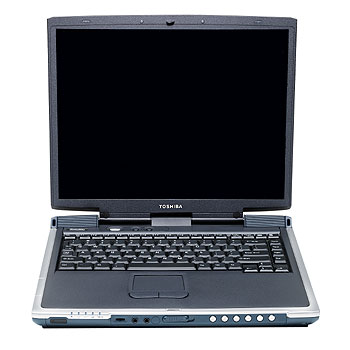| Good |
| Cheap (€850 including 20% vat and delivery) |
| Arrived within a week of the order |
| Fully supported by linux (with binary nvidia driver) |
| Bad |
| Only supports USB 1.1 |
| Battery only lasts for about 1.5 hours |
| Low contrast ratio on the 14" 1024x768 LCD (blacks look gray) |

I needed to buy a new laptop in June 2003 after my previous laptop was stolen.
The output from my sysinfo script is:
============= Disks =============
/dev/hdc: Model=TOSHIBA DVD-ROM SD-C2612, FwRev=1315, SerialNo=4342203398
/dev/hda: Model=TOSHIBA MK2018GAS, FwRev=Q2.03 E, SerialNo=43M53689T, Size=20.0 GB
============= CPUs =============
model name : Mobile Intel(R) Celeron(R) CPU 1.60GHz
============= MEM =============
384 MiB
============= PCI =============
-[0000:00]-+-00.0 Intel Corp. 82845 845 (Brookdale) Chipset Host Bridge
+-01.0-[0000:01]----00.0 nVidia Corporation NV17 [GeForce4 420 Go]
+-1d.0 Intel Corp. 82801CA/CAM USB (Hub #1)
+-1d.1 Intel Corp. 82801CA/CAM USB (Hub #2)
+-1e.0-[0000:02-05]--+-08.0 Intel Corp. PRO/100 Ethernet Controller
| +-0b.0 Toshiba ToPIC95 PCI to Cardbus Bridge
| \-0b.1 Toshiba ToPIC95 PCI to Cardbus Bridge
+-1f.0 Intel Corp. 82801CAM ISA Bridge (LPC)
+-1f.1 Intel Corp. 82801CAM IDE U100
+-1f.5 Intel Corp. 82801CA/CAM AC'97 Audio Controller
\-1f.6 Intel Corp. 82801CA/CAM AC'97 Modem Controller
============= USB =============
Bus# 2
`-Dev# 1 Vendor 0x0000 Product 0x0000
Bus# 1
`-Dev# 1 Vendor 0x0000 Product 0x0000
Did some benchmarking to compare with my new laptop
$ sudo /sbin/hdparm -tT /dev/hda /dev/hda: Timing cached reads: 1188 MB in 2.00 seconds = 594.09 MB/sec Timing buffered disk reads: 66 MB in 3.03 seconds = 21.78 MB/sec
$ ./nbench
BYTEmark* Native Mode Benchmark ver. 2 (10/95)
Index-split by Andrew D. Balsa (11/97)
Linux/Unix* port by Uwe F. Mayer (12/96,11/97)
TEST : Iterations/sec. : Old Index : New Index
: : Pentium 90* : AMD K6/233*
--------------------:------------------:-------------:------------
NUMERIC SORT : 694.8 : 17.82 : 5.85
STRING SORT : 52.276 : 23.36 : 3.62
BITFIELD : 2.6067e+08 : 44.71 : 9.34
FP EMULATION : 76.459 : 36.69 : 8.47
FOURIER : 8666 : 9.86 : 5.54
ASSIGNMENT : 16.898 : 64.30 : 16.68
IDEA : 1005.1 : 15.37 : 4.56
HUFFMAN : 852.17 : 23.63 : 7.55
NEURAL NET : 13.288 : 21.35 : 8.98
LU DECOMPOSITION : 641.76 : 33.25 : 24.01
==========================ORIGINAL BYTEMARK RESULTS==========================
INTEGER INDEX : 28.677
FLOATING-POINT INDEX: 19.124
Baseline (MSDOS*) : Pentium* 90, 256 KB L2-cache, Watcom* compiler 10.0
==============================LINUX DATA BELOW===============================
CPU : GenuineIntel Mobile Intel(R) Celeron(R) CPU 1.60GHz 1595MHz
L2 Cache : 256 KB
OS : Linux 2.6.12-1.1381_FC3
C compiler : gcc version 3.4.2 20041017 (Red Hat 3.4.2-6.fc3)
libc : libc-2.3.3.so
MEMORY INDEX : 8.258
INTEGER INDEX : 6.427
FLOATING-POINT INDEX: 10.607
Baseline (LINUX) : AMD K6/233*, 512 KB L2-cache, gcc 2.7.2.3, libc-5.4.38
* Trademarks are property of their respective holder.
General notes:
- The CD player buttons on the front work when the machine is off!.
Just pop a CD in and it's effectively a "portable" CD player.
However it is quite easy to inadvertently turn the laptop on which is annoying. - Hit Esc when toshiba logo is displayed on bootup and then F1 to enter the BIOS.
I Changed power settings so that the LCD was set to bright (rather than super-bright),
and also changed power off time for LCD to 10m (from 30m). - Exercising the 3D (nvidia chip) really uses battery.
I can only play about 1 hour of unreal tournament 2004 (which is hard on CPU also I suppose) - Attached a 20MB/s harddisk in a USB 2.0 hi speed HD cradle
and found out that the laptop only supports USB 1.1 :($ sudo /sbin/hdparm -t /dev/sda /dev/sda: Timing buffered disk reads: 4 MB in 4.18 seconds = 980.52 kB/sec
# smartlink modem (note this is what was in clevo (SiS 630) also) kernel 2.4 (FC1) notes kernel 2.6 (FC3) notes #I get 50666 from this modem at home. # the nvidia driver to get 3D acceleration support works perfectly. # glxgears gives 1281 frames per second #by default on redhat 9, /dev/toshiba is available (the SMM (System Management Mode)) #and a corresponding toshiba modules. Spooky. This also creates a /proc/toshiba #which presents the following info: 1.1 0xfca9 2.81 1.40 0x2642 0x00 #Which corresponds to: 0) Linux driver version 1) Machine ID 2) SCI version 3) BIOS version (major, minor) 4) BIOS date (in SCI date format) 5) Fn Key status #With Fedora core 3, /proc/acpi/toshiba is available #Installed kernel 2.6.13-rc2-mm1 and got much #better battery usage as CPU now mostly in ACPI C3 state! #2.6.11-1.14_FC3 at least only gets to C2.
Update - Apr 2011
I've been considering getting a new laptop lately, and Toshiba Satellite notebooks are top of my list again, given the recent decrease in choice and increase in price of Dell laptops. The C660-155 particularly piqued my interest, as I detailed on twitter. It's a dual core i3, with 4GB RAM, 320GB disk, 15.6" 1366x768 screen and 3 USB ports for €450. Also toshiba laptops have good availability of third party components like laptop batteries etc. This laptop has no HDMI though. Also, I might hold out for a higher resolution screen.
© May 31 2006